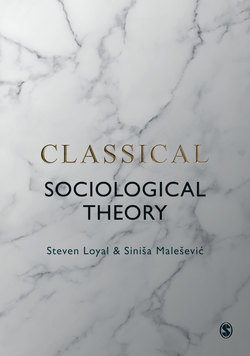Читать книгу Classical Sociological Theory - Sinisa Malesevic - Страница 18
На сайте Литреса книга снята с продажи.
Slaves, Foreigners and Women in Athens
ОглавлениеDuring Pericles’ time about 50,000 male citizens lived in Athens. When slaves, foreigners (metics) women and children were included the population varied between 200,000 and 300,000 people. Neither the poorest peasant nor the richest philosopher could conceive a world without slaves since both benefited enormously from the institution. The largest individual holdings of slaves in Athens were workers in the mines; it is estimated that about 30,000 slaves worked in the Athenian silver mines in Laurium. Others were in domestic service held by Greeks. Most of the leisure class owned slaves. Plato mentioned 5 in his will whereas Aristotle had 14 when he died. At all times and in all places Greeks relied on some form of dependent labour to meet public and private needs. The ideal of being a citizen in Athens was one who could hold public office, discuss politics, vote and sit on juries. In the context of Greek values and practice, slavery was generally seen as a natural and unquestioned phenomenon in ancient Greece. The slave was seen as a non-person, an unfree body of human stock, and the chief market day for cattle was the same as for slaves. Very few challenged the moral basis of slavery. The exact number of slaves in Athens is a matter of dispute. Finley (1991: 72) argues for a figure between approximately 60,000 and 80,000 slaves. Anderson argues for a slightly higher figure of 80,000–100,000 so that the ratio of slaves to free men in Periclean Athens was approximately 3:2 and that although the slave mode of production was the central productive force in Hellenic society, other producers included free peasants, dependent tenants and urban artisans (Anderson, 1978: 21–2).
If adult males were responsible for politics, which, as Aristotle noted, required a man of leisure (schole), this presupposed a large amount of menial work being undertaken by slaves but also by women and foreigners. Women were not an undifferentiated mass and their position varied according to their economic and social status. Although women of all classes went to festivals and funerals, those who were citizens were expected to marry and have children but not engage in the public sphere of politics yet remain in the private sphere of the oikos leading spatially secluded lives. In her book Goddesses, Whores, Wives, and Slaves: Women in Classical Antiquity, Pomeroy notes:
Socrates blunt dismissal of his wife Xanthippe from his deathbed and his desire to die among his male companions is a dramatic, if exaggerated, indication of the emotional gulf between husband and wife. The distance between husbands and wives extended to other spheres… While men spent most of their day in public areas such as the marketplace and the gymnasium, respectable women remained at home. In contrast to the admired public buildings, mostly frequented by men, the residential quarters of Classical Athens were dark, squalid, and unsanitary. Women stayed home not only because their work did not allow them much chance to get out but because of the influence of public opinion. Many families were likely to own at least one female slave, but even a woman with slaves was tied down by the demands of her household, husband, and infants. (1995: 79)
[Republished with permission of Blackwell, from The Blackwell Companion to Major Social Theorists, G. Ritzer, 2000. Permission conveyed through Copyright Clearance Center, Inc]
The democratic experiment reached its peak under Pericles, and Plato wrote at a time when Athens was at a crossroads following a huge military loss in the Peloponnesian War. The war lasted over 25 years, led to the death of nearly half the population and cast a huge shadow over Athens and its cultural achievements. Plato saw all this as a consequence of democracy, amateur rule and misrule. In addition, he witnessed constant and inconclusive fighting between the numerous Greek city-states and as a result often called for Greek unity.
